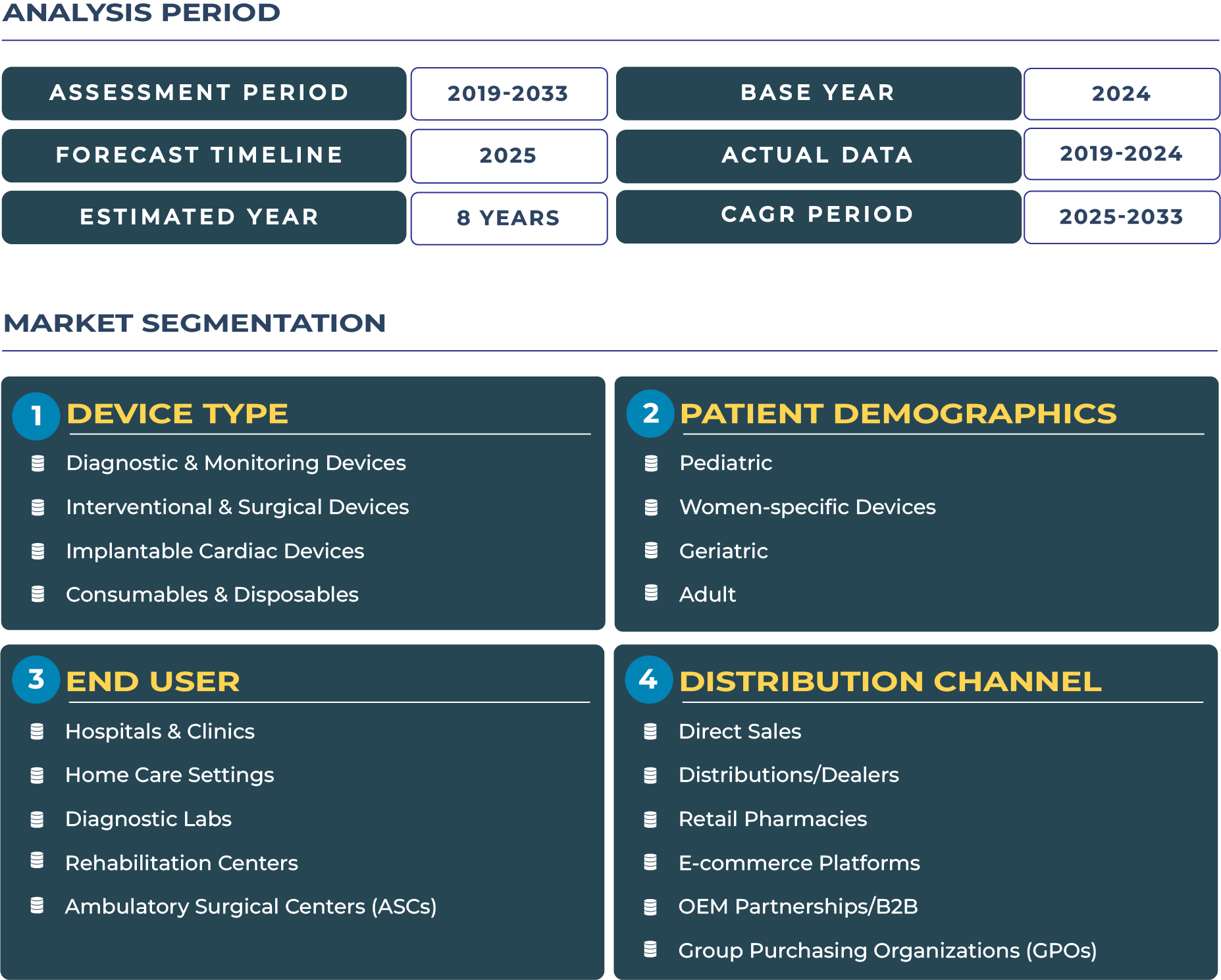Argentina Cardiovascular Devices Market Outlook: A Private Hospital-Driven Cardiovascular Devices Market Led by Urban Centers
Argentina cardiovascular devices market is characterized by the dominance of private hospitals, particularly in urban hubs such as Buenos Aires, Córdoba, and Rosario. These metropolitan areas drive demand for advanced cardiovascular technologies as private hospitals upgrade facilities and adopt cutting-edge interventional and implantable devices. Despite the economic volatility that continues to challenge healthcare budgets, the private sector has emerged as the primary channel for device adoption. Private insurers and financing models are increasingly bridging affordability gaps, making Argentina one of the most dynamic cardiovascular devices markets in Latin America. Regulatory processes managed by the ANMAT remain crucial for market entry, reinforcing the need for strong local partnerships to navigate Argentina’s complex healthcare landscape.
Accelerated Argentina Cardiovascular Devices Market Growth Despite Economic Challenges
The Argentina cardiovascular devices market is estimated at USD 201.4 million in 2025 and projected to reach USD 585.3 million by 2033, growing at a CAGR of 14.3%. This rapid expansion underscores the resilience of Argentina’s private healthcare system amid economic volatility. Strong clinical expertise, rising prevalence of cardiovascular disease, and consistent investments in private cardiology facilities drive growth. Despite risks related to inflation and currency fluctuations, the sector’s ability to leverage private insurance, patient financing programs, and targeted partnerships ensures sustained demand. As a result, Argentina is becoming a key market for companies focused on advanced cardiovascular technologies, particularly in urban hospitals with strong referral networks. (Source: DataCube Research, 2024)
Why Argentina Cardiovascular Devices Ecosystem Is Poised for Private Sector Expansion
The cardiovascular devices landscape in Argentina reflects both opportunity and constraint, shaped by its distinctive healthcare structure. While the public sector struggles with budget limitations, the private sector continues to deliver strong growth, particularly in urban markets. Hospitals in Buenos Aires have become early adopters of implantable cardiac devices and interventional technologies, capitalizing on the availability of skilled cardiologists and surgical specialists. In 2024, the sector saw an uptrend in demand for consumables and disposables that support minimally invasive interventions, with private facilities ensuring consistent procurement despite currency fluctuations. Looking ahead, the projected CAGR of 14.3% highlights Argentina’s potential to emerge as one of the fastest-growing cardiovascular markets in the region. Political uncertainties and economic challenges persist, but the adaptability of private hospitals and their willingness to adopt flexible financing solutions position Argentina as an attractive hub for both global and domestic device manufacturers.
Drivers & Restraints: Understanding the Push and Pull Dynamics in Argentina’s Cardiovascular Devices Industry
Strong clinical talent and private healthcare infrastructure drive adoption
Argentina’s healthcare system benefits from highly trained cardiologists and a dense network of private hospitals concentrated in urban areas. These facilities invest heavily in diagnostic and monitoring devices, as well as surgical technologies, to maintain high standards of cardiac care. Regional referral patterns, particularly in Buenos Aires, allow private hospitals to attract patients from across the country, reinforcing their role as demand drivers for cardiovascular devices.
Economic volatility and currency risks restrain scalability
On the downside, persistent inflation, high borrowing costs, and currency depreciation create volatility in procurement for cardiovascular devices. Public hospitals face severe budgetary constraints, leaving much of the advanced device adoption to the private sector. Currency risk also increases costs for imported devices, leading hospitals and distributors to seek flexible pricing models and payment structures. Regional disparities exacerbate these challenges, with rural areas seeing limited access to advanced cardiac care technologies, thereby creating an uneven market landscape.
Trends & Opportunities: Identifying Growth Pathways in Argentina’s Cardiovascular Devices Sector
Private hospital upgrades and consumables surge
Recent years have witnessed significant investments by private hospitals in urban centers, with upgrades focused on surgical and interventional cardiac units. The expansion of catheterization labs has spurred higher demand for consumables and disposables, as procedures become more frequent. Additionally, urban hospitals are investing in telecardiology solutions that support continuous patient monitoring.
Opportunities in financing partnerships and distributor-led growth
Flexible financing schemes are emerging as a key enabler for cardiovascular device adoption in Argentina. Collaborations between device manufacturers, private hospitals, and insurance providers create new opportunities to make high-cost interventions more accessible. Distributors play an increasingly important role in bridging gaps caused by import challenges, offering bundled services and localized pricing strategies. With Argentina’s geographic position and strong private hospital ecosystem, the market also has potential to support regional medical tourism in cardiology services, particularly for neighboring countries with weaker healthcare infrastructure.
Competitive Landscape: Leveraging Pricing Flexibility, Local Alliances, and Physician Training
The competitive landscape of Argentina’s cardiovascular devices market features a mix of global leaders and local distributors. Multinational companies such as Medtronic remain key players, focusing on physician training and long-term partnerships with private hospitals. Local distributors are critical for navigating currency volatility, offering pricing flexibility and value-added services. In 2024, new private hospital investments in Buenos Aires and Córdoba reinforced the demand for consumables and interventional tools. Pilot telecardiology projects launched in urban centers further highlight the industry’s shift toward integrated care models. Companies that adapt with flexible financing, robust distributor networks, and training initiatives for cardiologists are best positioned to thrive in Argentina’s high-potential cardiovascular devices market.







